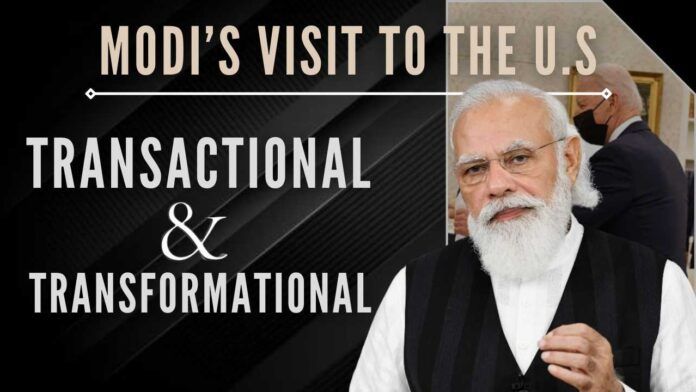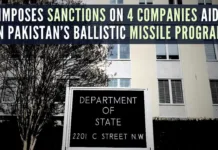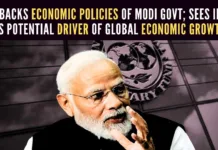
Key takeaways from PM Modi visit to US
India’s Prime Minister Modi clocked about 65 hours on U.S. soil from landing in the nation’s capital to take off from the financial capital, New York City. Reportedly, he conducted 20 meetings while on the ground. This is a man we can call a master time manager and planner, and work alcoholic but also a politician, strategist, and technocrat in his own right. He is known to sleep very little but is always alert and fresh with his yoga routine, lifestyle, and healthy diet. Modi’s first transformational stroke and a gift to the global community were when the United Nations embraced the International yoga day for the good of humanity. Yoga is a deeply rooted practice and science of good health in India’s ancient culture.
At one level, most of Modi’s meetings were transactional because he was seeking collaboration, cooperation, and investments that are mutually beneficial and rewarding. His task was to protect India’s interests, for example, in trade, technology, and talent while offering some things in return. In that respect, his bilateral meetings with the CEOs, President Biden, VP Harris, and his counterparts of Japan and Australia were primarily transactional in nature.
Modi’s speech at the UN General Assembly was very transformational in communicating with the world.
It is no brainer that when talking with the CEOs, Modi must be promoting India’s strengths, positive business climate, political stability, and assurance that their FDI will not only be safe but the shareholders will be happy with the ROI. I surmise that even the transactional discussions, in the long run, will transform India and Indians. The investments will lead to job opportunities for India’s talented youth and potential for innovation and new technologies/ products that may increase India’s export. In fact, a recent book, “Brand New Nation: Capitalist Dreams and Nationalist Designs in Twenty-First Century India (2020),” focuses on India’s transformation. The author reviews the long history of the economic reforms and delves into the yet ongoing transformation of the postcolonial nation into an ‘attractive investment destination[1].’
Rest of Modi’s bilateral meetings with the leaders of the United States, Japan, and Australia, the discussions definitely went beyond being transactional as they discussed national and global issues. These include, but are not necessarily limited to, terrorism, green energy, environment, sustainability, how to vaccine the Covid inflicted world, Taliban’s Afghanistan as a potential threat to girls and women, and different nations’ efforts in defending against the territorial and/ or economic threats. For example, India will manufacture 1 billion doses of vaccines for the global good for vaccinating the less privileged population in the world[2]. Undoubtedly, it is much more than just transactional and indicates India’s unprecedented technological and manufacturing prowess and transformation.
The fact that India was a part of the QUAD is in itself transformational. The leaders of four democratic countries discussing the global geopolitical diplomacy against the invisible elephant in the room (that is China) is transformational and triumphant for India. China has unusually troubling trade relations with Australia, territorial issues about an island with Japan, the ongoing skirmishes and threat to India along the Line of Actual Control (LAC) in the Ladakh region, and many longstanding issues of stealing the intellectual property to the trade war and imbalance with the U.S. The ongoing joint defense exercises by QUAD, the future plans on accelerating those, regular QUAD meetings, and other strategies are transformational with global consequences to contain China’s aggressive efforts in the South China sea.
Finally, Modi’s speech at the UN General Assembly was very transformational in communicating with the world. This is perhaps the first time that a bold and confident Indian Prime Minister told the world, in a roaring voice, “when India reforms the world transforms.” Never before India had that degree of confidence to proclaim that if India grows the world grows. India has also transformed its vision in global diplomacy. Not only that Modi did not spend even a second in his UNGA speech talking about Pakistan or China, but it was left to highly skilled diplomats to offer a fitting response to the barrage of lies and accusation by Pakistan’s Imran Khan. Modi only delved into strategic global issues and challenges and how India could help or offer solutions.
The twenty-first century new India has decidedly come a long way in becoming more transformational in its policies, practices, politics, and people-to-people exchanges. India’s global influence is on the rise and unparalleled in post-independence India. All of this, of course, begins with transactional conversations between any two individuals and/ or nations but Modi as a statesman, politician, and diplomat is transforming India to new heights. Modi is not only in transforming economic reforms but has attained India her due place and prestige being equal among the nations. No surprise that India’s Modi is among the top 100 influential leaders in 2021.
Note:
1. Text in Blue points to additional data on the topic.
2. The views expressed here are those of the author and do not necessarily represent or reflect the views of PGurus.
References:
[1] Brand New Nation: Capitalist Dreams and Nationalist Designs in Twenty-First Century India – Stanford University Press
[2] Quad Partnership On Track To Produce 1 Billion Covid Jabs In India, Says Joe Biden – Sep 23, 2021, NDTV
- Education and election in Bharat: Race to the top - April 16, 2024
- Kejriwal: “An Insignificant Man” or a corrupt politician with impending prison term - March 24, 2024
- Bharat’s general elections and the Model Code of Conduct - March 22, 2024










